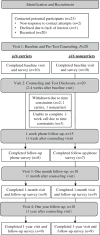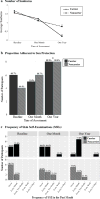Genetic Test Reporting and Counseling for Melanoma Risk in Minors May Improve Sun Protection Without Inducing Distress
- PMID: 29349527
- PMCID: PMC6039245
- DOI: 10.1007/s10897-017-0185-5
Genetic Test Reporting and Counseling for Melanoma Risk in Minors May Improve Sun Protection Without Inducing Distress
Abstract
Genetic testing of minors is advised only for conditions in which benefits of early intervention outweigh potential psychological harms. This study investigated whether genetic counseling and test reporting for the CDKN2A/p16 mutation, which confers highly elevated melanoma risk, improved sun protection without inducing distress. Eighteen minors (Mage = 12.4, SD = 1.9) from melanoma-prone families completed measures of protective behavior and distress at baseline, 1 week (distress only), 1 month, and 1 year following test disclosure. Participants and their mothers were individually interviewed on the psychological and behavioral impact of genetic testing 1 month and 1 year post-disclosure. Carriers (n = 9) and noncarriers (n = 9) reported significantly fewer sunburns and a greater proportion reported sun protection adherence between baseline and 1 year post-disclosure; results did not vary by mutation status. Anxiety symptoms remained low post-disclosure, while depressive symptoms and cancer worry decreased. Child and parent interviews corroborated these findings. Mothers indicated that genetic testing was beneficial (100%) because it promoted risk awareness (90.9%) and sun protection (81.8%) without making their children scared (89.9%); several noted their child's greater independent practice of sun protection (45.4%). In this small initial study, minors undergoing CDKN2A/p16 genetic testing reported behavioral improvements and consistently low distress, suggesting such testing may be safely implemented early in life, allowing greater opportunity for risk-reducing lifestyle changes.
Keywords: CDKN2A/p16; Children; Familial melanoma; Genetic counseling; Prevention; Sun protection.
Conflict of interest statement
Ms. Kohlmann has consulted for Myriad Genetics Laboratory in the past on unrelated projects and received a research grant from Myriad Genetics Laboratory to study the psychological and family communication outcomes of multigene panel testing. That work is unrelated to the research reported here.
Ms. Champine has been compensated for serving on the Genetic Counseling Advisory Board for Invitae, which is a for-profit genetic testing laboratory.
Dr. Stump, Dr., Aspinwall, Ms. Hauglid, Dr. Wu, Ms. Scott, and Dr. Cassidy declare that they have no conflicts of interest.
Figures



References
-
- Aspinwall LG, Taber JM, Leaf SL, Kohlmann W, Leachman SA. Melanoma genetic counseling and test reporting improve screening adherence among unaffected carriers 2 years later. Cancer Epidemiology, Biomarkers & Prevention. 2013b;22(10):1687–1697. doi: 10.1158/1055-9965.EPI-13-0422. - DOI - PMC - PubMed
Publication types
MeSH terms
Grants and funding
LinkOut - more resources
Full Text Sources
Other Literature Sources
Medical
Miscellaneous

